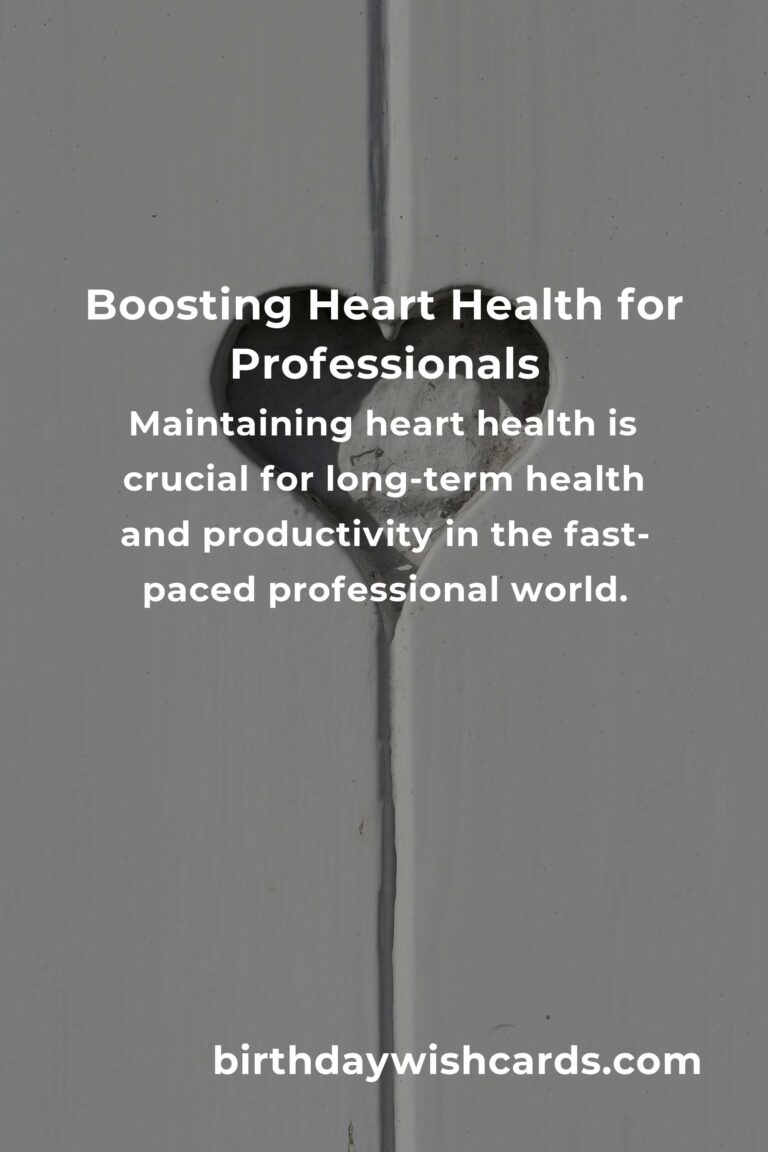
In the fast-paced world of professional life, maintaining heart health often takes a backseat. However, it’s crucial to prioritize cardiovascular wellness to ensure long-term health and productivity. This comprehensive guide will provide you with practical strategies to improve heart health, even with a hectic schedule.
The Importance of Heart Health
The heart is the engine of the human body, pumping blood and supplying oxygen and nutrients to tissues while removing carbon dioxide and other wastes. A healthy heart is essential for overall well-being and longevity. For professionals, neglecting heart health can lead to serious consequences, including heart disease, stroke, and other cardiovascular conditions.
Understanding Risk Factors
Before implementing changes, it’s important to understand the risk factors that can impact heart health. These include high blood pressure, high cholesterol, smoking, obesity, physical inactivity, and stress. Identifying and mitigating these risk factors is key to maintaining a healthy heart.
Simple Lifestyle Changes
1. Incorporate Physical Activity: Regular exercise is one of the most effective ways to improve heart health. Aim for at least 150 minutes of moderate aerobic activity or 75 minutes of vigorous activity each week. Even short, frequent walks during breaks can significantly benefit your heart.
2. Adopt a Heart-Healthy Diet: Eating a balanced diet rich in fruits, vegetables, whole grains, lean proteins, and healthy fats can lower the risk of heart disease. Avoid trans fats, excess sodium, and added sugars to promote cardiovascular health.
3. Manage Stress: Chronic stress is a major contributor to heart disease. Practice stress-reducing techniques such as deep breathing, meditation, or yoga. Ensuring adequate sleep and work-life balance can also help manage stress levels effectively.
4. Quit Smoking: Smoking is a significant risk factor for heart disease. Quitting smoking can improve heart health and reduce the risk of heart-related complications.
5. Monitor Health Metrics: Regularly check your blood pressure, cholesterol levels, and body weight. Keeping these metrics in check can prevent the onset of heart disease.
Workplace Strategies for Heart Health
Professionals often spend a significant amount of time at work, making it essential to incorporate heart-healthy habits into the workplace. Here are some strategies:
1. Stand and Move: Avoid sitting for extended periods. Use a standing desk or take short breaks to stretch and walk around.
2. Healthy Snacking: Keep nutritious snacks like nuts, fruits, and yogurt at your desk to avoid unhealthy temptations.
3. Optimize Work Environment: Create a stress-free work environment by organizing your workspace and managing time efficiently.
4. Team Activities: Encourage team-based physical activities, such as group walks or fitness challenges, to promote a culture of health and wellness.
Conclusion
Improving heart health for busy professionals is achievable with conscious effort and small lifestyle changes. By incorporating regular physical activity, a balanced diet, stress management, and workplace strategies, you can significantly enhance your heart health and overall well-being. Remember, taking care of your heart is not just a personal health priority but also a professional one, as it directly impacts productivity and quality of life.
Start today by making these heart-healthy changes and encourage your colleagues to do the same for a healthier, more vibrant professional life.
Maintaining heart health is crucial for long-term health and productivity in the fast-paced professional world.
Understanding and mitigating risk factors like high blood pressure and stress is key to maintaining a healthy heart.
Regular exercise and a balanced diet are effective ways to improve heart health.
Incorporating heart-healthy habits in the workplace can significantly benefit professionals.
Taking care of your heart directly impacts both personal health and professional productivity.
#HeartHealth #ProfessionalWellness #HealthyLifestyle #CardiovascularHealth













